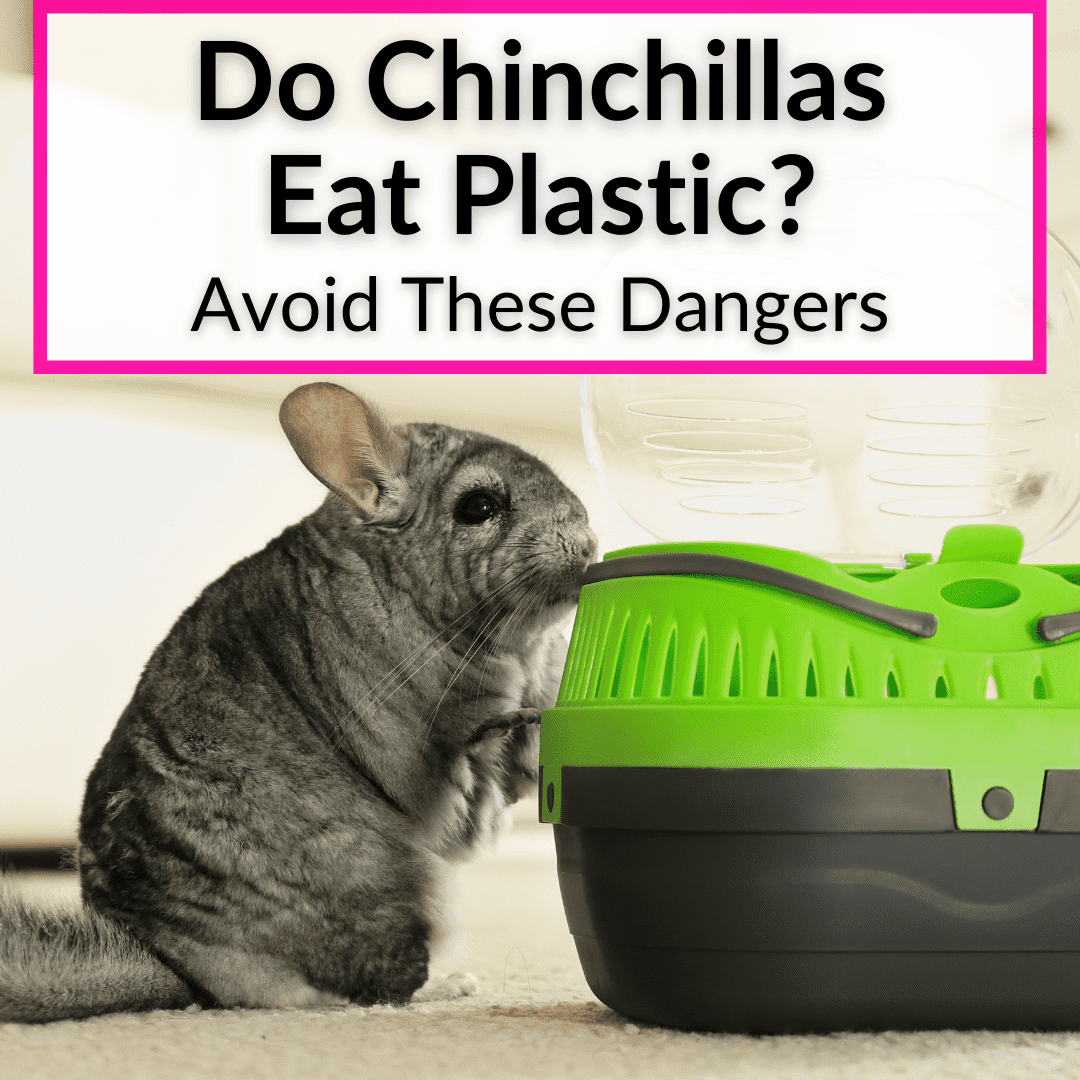
These little rodents chew on everything.
They have to chew. It’s the only way to keep their teeth from growing too large and causing injury.
It is up to you to ensure they don’t chew on anything harmful.
So what about plastic? Do chinchillas eat plastic?
And is it harmful if chewed or ingested?
Keep reading for all of those answers and more. You need to know this, if you want to keep your little chinchilla safe and healthy.
Contents
Do Chinchillas Eat Plastic?
Yes, chinchillas will eat plastic. They chew on everything and will chew plastic if given the opportunity.
This can lead to potential health concerns and digestive blockages. That is why you need to keep plastic away from your chinchilla. Make sure the cage, and the accessories in the cage, contain no plastic.
This may seem extreme, because nearly everything produced today has some plastic in it. But it is possible to find items containing no plastic.
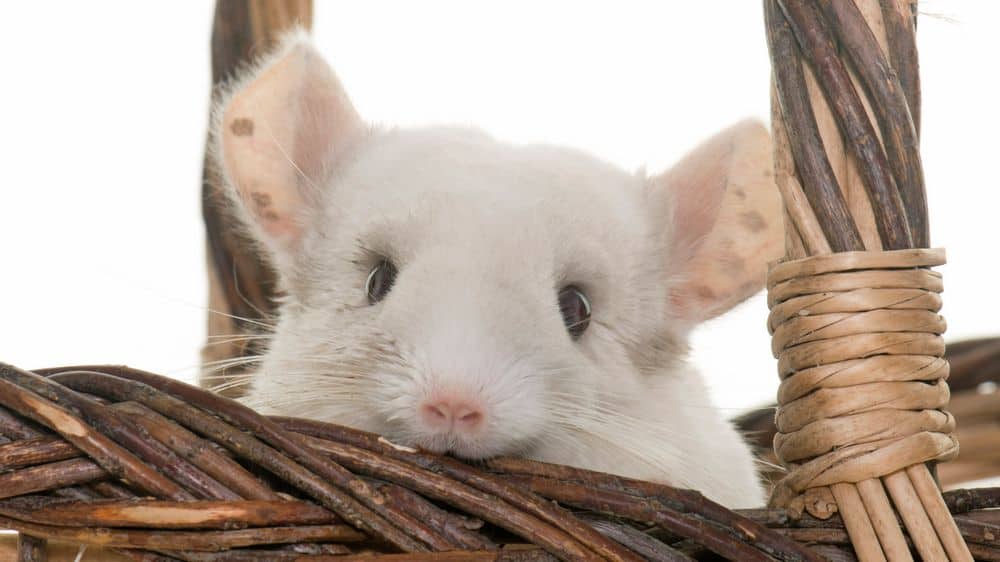
If you are concerned about what to do, what accessories to buy, and what is safe for a chinchilla, you are in the right spot.
That’s what the rest of this brief 3-minute post is all about.
I’m going to break down what you need to know about a chinchilla consuming and eating plastic, how to avoid it, and what alternatives to implement.
Knowing the information contained in this post is essential for caring for your chinchilla ethically.
Why Chinchillas Chew And Eat Plastic
If plastic is accessible, your chinchilla will chew it. And it will likely swallow some of it.
But it’s not about the plastic. Chinchillas naturally chew. On everything.
As rodents, chinchillas have teeth that never stop growing. They need to chew in order to file down their teeth. Otherwise they grow too long and cause serious injury.
This chewing behavior is part of the reason that proofing the room where you let your chinchilla roam out of its cage is always a top priority.
You need to cover cords and wires to protect your chinchillas. And plastic items are another thing you should remove or otherwise make inaccessible
If you need help with this, read my post about chinchillas chewing wires. It includes my top tips and tricks for effectively proofing a room to avoid this danger.
It is your job to make sure your pet does not chew on anything harmful, just as it is your job to provide toys that are safe to chew.
When it comes to making the cage and the room where your chinchillas gets to come out to play safe, many owners overlook plastics. That’s because they are so prevalent.

So many rodent accessories contain plastic. Chinchillas wheels, nesting boxes, and even water bottle nozzles can all have plastic components.
It is difficult to avoid, but you need to keep plastic out of your chin’s life as much as possible. They can cause serious harm if ingested, which happens to be the topic we will cover next.
Is Plastic Safe For Chinchillas?
No, plastic is not safe for chinchillas. Plastic can contain harmful material for your chinchilla and can also cause digestive tract issues if ingested.
Chinchillas have very sensitives stomachs and digestive tracts. Even more so than other small rodents.
Blockages are one of the common issues that arise. And it’s often due to situations just like this, where the owner of the chinchilla was simply unaware that their new pet will chew its way into an illness or injury.
Unfortunately, it’s just how it goes with chinchillas.
Monitor Your Chinchilla For Blockages
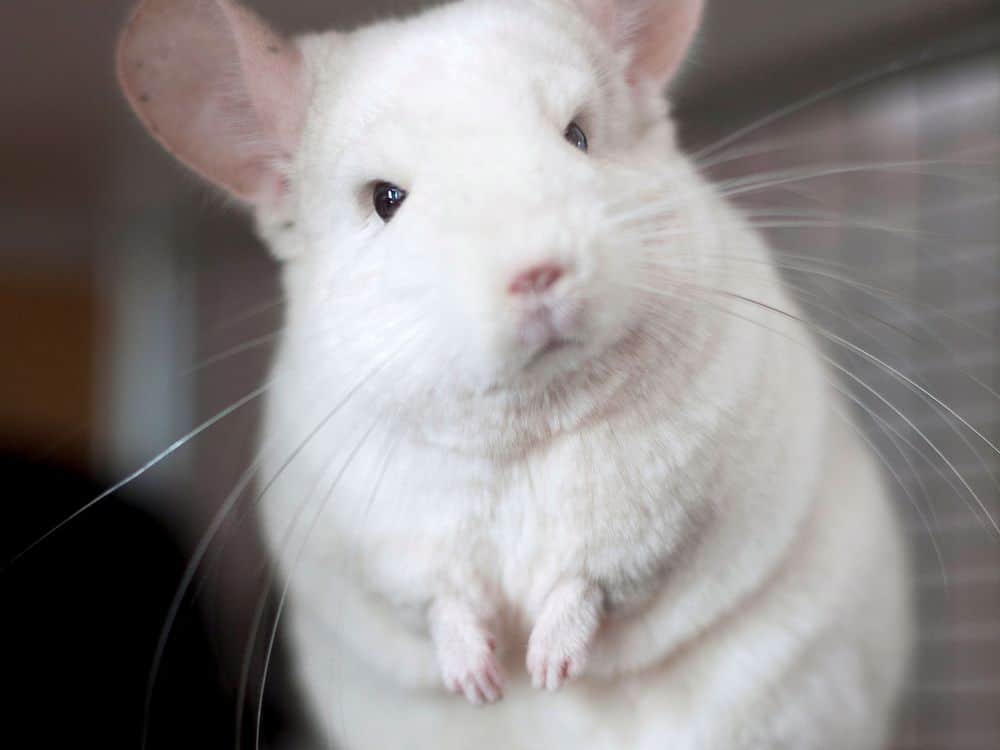
Let’s assume for a second that you landed on this post because you fear your chinchilla already ingested some plastic.
This happens from time to time, and we all make mistakes.
It’s nearly impossible not to give your chinchilla a toy throughout its 15 to 20 year lifespan that potentially has something harmful they should not be chewing on.
Before moving too deep into my recommendation, let me make one thing perfectly clear. I’m not a vet, I’ve never been to veterinarian school.
I do, however, own a chinchilla and have researched everything involving these furry rodents.
Disclaimer out of the way, the best thing to do in the beginning is to simply monitor your chinchilla’s pooping and ensure that it is still eating and consuming fluids.
If it is not eating, not drinking water and/or not pooping, it’s time to seek out a professional. And do so quickly, because a blockage can cause death.
However, if your chinchilla is pooping normally, still has an appetite, and is still consuming fluids, it’s likely your pet is perfectly fine. Whatever tiny pieces of plastic it ingested will simply passing out the other end.
Trust me, it’s not going to be hard for you to know if your chinchilla is pooping normally.
Chinchillas poop literally non-stop.
If you aren’t seeing chinchilla poop within a few hours, you have an issue. Again, if this is the case, call a vet!
Now let’s move on to the cage, because many of the cages on the market contain some plastic.
Can Chinchillas Have Plastic Cages?
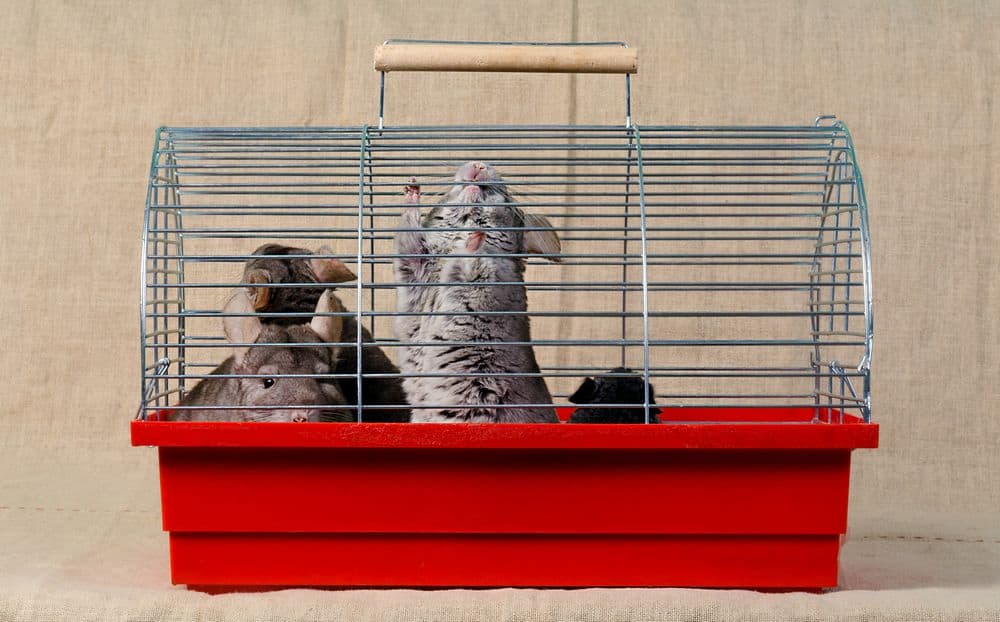
Yes, chinchillas can have plastic cages. They are usually made from a hard plastic that they won’t be able to chew. But not always.
Your best bet is to avoid plastic cages altogether, even those that have a number of plastic parts, but are otherwise made from metal. A chinchilla chewing on cage bars is all-too-common.
I highly recommend sticking to a more robust cage like the Critter Nation 2. It is the cage I use myself and it uses a thin wire bar construction.
If you want a few other options, read more reviews of the best chinchilla cages.
Plastic cages are highly unlikely to cause direct harm, but the cage should be a one-time purchase, so it makes sense to spend a bit more for a much better cage that is not made of plastic.
The price difference is actually much smaller than you might think. Also, plastic cages could still entice your chinchilla to chew, so it is just best to avoid them, if possible.
Why waste the money on a cage your chinchilla will eventually damage or chew?
The cage is almost certainly the most expensive purchase you will make owning a chinchilla, so you might as well get it right the first time.
How Do I Stop My Chinchilla From Chewing?
Ah, the question of the day. How do you stop a chinchilla from chewing?
The answer is simple: you don’t.
Let me rephrase: you should not stop your chinchilla from chewing.
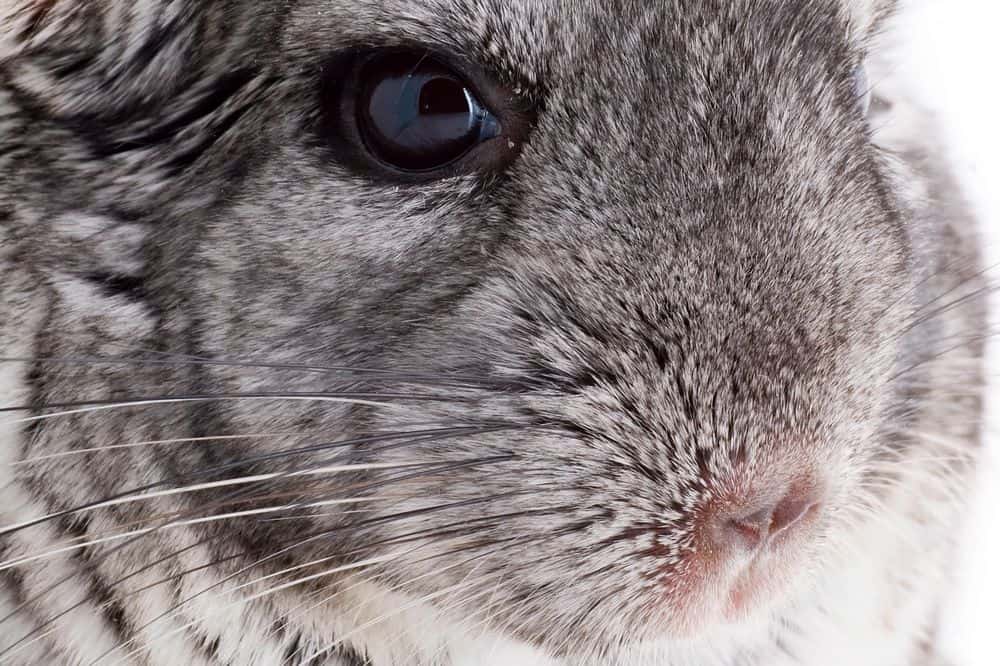
As mentioned above, chinchillas need to chew to keep their teeth filed down and healthy.
The goal isn’t to get your chinchilla to stop chewing, but to ensure you promote chewing on healthy alternatives.
I love chew sticks that are designed explicitly for rodents such as chinchillas. You can see the exact chew sticks I use here.
They are affordable, and your chinchilla will love them. Again, don’t attempt to get your chinchilla not to chew. Just ensure it is chewing in a safe and healthy manner.
Additional Safety Precautions To Implement
Listen, my friends. Owning a chinchilla is not difficult.
You just need to monitor certain things and keep an eye on the situation from time to time.
If you are trying new toys, simply double check they aren’t chewing them and possibly ingesting anything harmful.
If they are, switch to a safer alternative. You want to make sure all toys will cause no harm if chewed. And when it comes to chew toys, this should be even more obvious. Nothing harmful!
For the most part, chinchillas are extremely easy to take care of, but if there is one thing to always monitor and keep tabs on, it’s certainly chewing.
Shelves And Other Common Plastic Items To Avoid
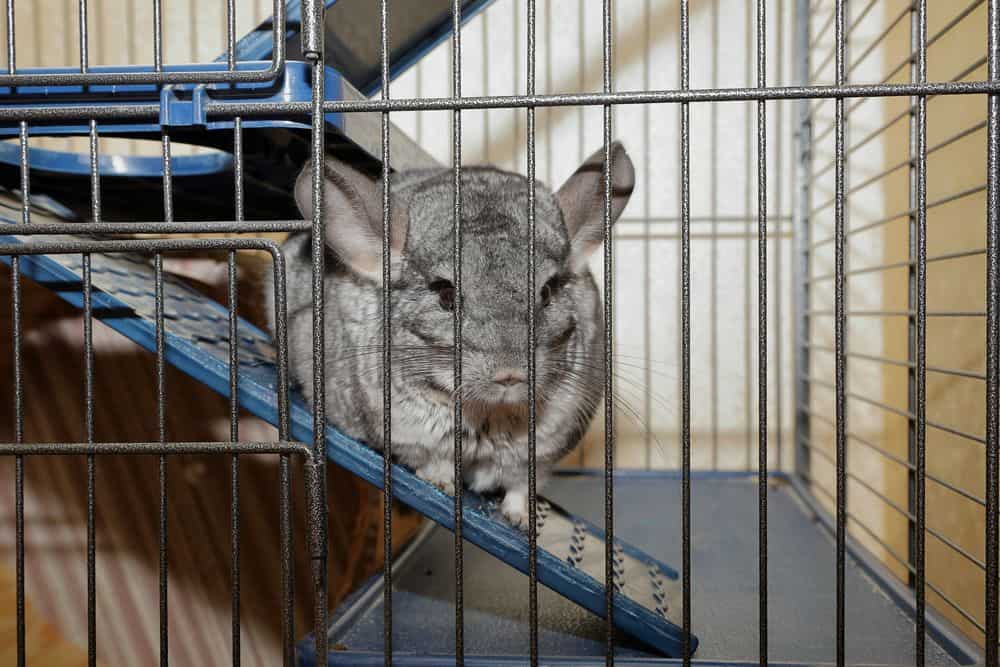
The last item on my agenda to cover today is the shelves you place inside of your chinchilla cage.
Chinchillas need these shelves. Chinchillas love to jump and climb and need plenty of space that allows them to do so.
However, many shelves on the market are made from plastic. Avoid these, if at all possible. This is just another item your chinchilla will chew if given the chance.
Stick to cheaper wood shelves for your chinchilla. They are easy to cut yourself and attach to the cage. This saves you money and keeps your chinchilla safe.
Chinchillas Chewing Plastic: Final Thoughts
At the end of the day, will a chinchilla eat and chew plastic?
Yes, they certainly will.
In most circumstances, it will be perfectly fine. But it still needs your attention, because there is the potential to cause illness or other health concerns for your chinchilla.
Best of luck with your chinchilla adoption or chinchilla parenting.
Now over to you!
I always enjoy it when you chime in and share your thoughts on the topic.
Does your chinchilla chew plastic?
Have you ever had any issues with chinchilla chewing?
Be sure to share your thoughts, concerns, and stories by dropping a comment below.
As always, Chili and I appreciate you stopping by and reading. We will see you next time.

Denise Rosato says
I am confused. I bought one of the cages posted as the best; however it has plastic that I noticed after I came home to it already built. Is that plastic ok since it is listed as one of your choices?
Charlotte says
We just bought a wired large cage for our 2 chinchillas but the problem is the shelves are also wired. If we put wood the urine would penetrate in there. What else can we use?
Josh says
Fleece liners work really well. There are ones already precut for some of the popular cages, but you can also just make your own.